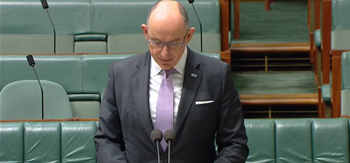The federal government has introduced long-anticipated data sharing laws to parliament in a bid to make it easier for the public sector to share data within government and the private sector.
The Data Availability and Transparency Bill 2020 was introduced by Government Services Minister Stuart Robert on the second last sitting day of 2020.
It follows more than two years of consultation by the Department of Prime Minister and Cabinet, including 76 public roundtables, following a 2018 Productivity Commission report.
An exposure draft was released in mid-September, introducing a requirement for agencies to seek consent before releasing personal information unless unreasonable or impractical.
The government had previously said that consent should only be encouraged, as a consent-based model for data sharing “could create biases in data”.
The bill, which was introduced alongside the Data Availability and Transparency (Consequential Amendments) Bill 2020, is intended to unlock data by overcoming existing legislative barriers.
It will create a scheme allowing agencies to more freely share data with accredited entities across all levels of government, as well as industry, research and other private sector organisations.
The pathway will be optional for agencies or data custodians, with “existing mechanisms and arrangements for sharing [to] continue to be available”.
Unlike open release to the public, access to data by accredited entities will be “controlled”, and overseen by a new independent regulator, the National Data Commissioner.
Accredited users and data service providers (ADSPs) will be able to access data for only three purposes: service delivery, informing policy and program, and research and development.
According to the bill's explanatory memorandum, prospective recipients will be assessed to ensure they are “capable of managing scheme data accountably” and to “minimise risks of unauthorised access”.
Agencies will also need to establish a data sharing arrangement with any accredited users and ADSPs that will set out of the terms and conditions of the data sharing project.
Government Services Minister Stuart Robert said the new laws were needed to modernise the “layers of old contradictory rules and inconsistent ways of sharing data”.
“We’re working in a tangled data sharing system, and this bill is frankly design to straighten it out,” he said on Wednesday.
Robert said that the bill was “not about publishing data on a website or releasing data without control”.
Public sector data is defined as “facts, statistics, and other information that are capable of being communicated, analysed or processed via physical or electronic means”.
It excludes “especially sensitive data handled under other legislation” such as My Health Record data, COVIDSafe app data and national security data.
Data that would “infringe intellectual property rights or international agreements” is similarly not authorised for sharing.
The government has already ruled out using the laws to collect data for compliance and assurance purposes to avoid a repeat of robodebt.
More to come


























